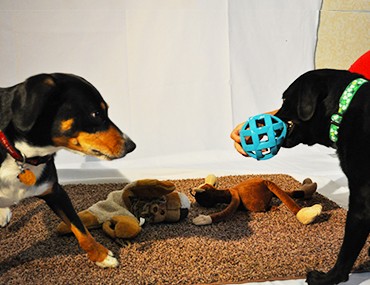Overview
There’s the bird flu, the swine flu, and the plain old flu. And then there’s the dog flu.
Also known as canine influenza, the dog flu is cause by a particular strain of the influenza virus that can be passed very easily between dogs. Luckily, even though it’s similar to the flu in humans, it isn’t zoonotic, meaning it can’t be transmitted from pet to parent. It’s important to note while canine influenza can stand alone, it is often involved with other infections that combine to cause what’s known as “kennel cough.” While there have been outbreaks of pure canine influenza virus throughout the world, it has only recently been identified.
For the most part, dog flu infections are mild and dogs are able to recover in a couple of weeks. Sometimes, however, the infection can become severe. 
Risks and Symptoms
As you might expect, dog flu symptoms are similar to those caused by human influenza – coughing, runny nose, aches, and fever. Dogs can pick it up other dogs through direct contact, contaminated bowls or toys, or even by touching you after you’ve touched an infected dog.
Any dog that is around lots of other dogs is at risk for the dog flu. That means that if your dog visits dog parks, participates in dog shows, or is regularly boarded, he will have a higher risk of infection. Most facilities take special precautions to prevent the spread of contagious diseases such as dog flu or kennel cough, but that doesn’t mean your dog isn’t at risk.
Dogs with canine influenza can show a variety of symptoms. While some infected dogs may not show any symptoms at all, they are still contagious. A small percentage of dogs will have a harder time with the virus and may develop high fevers or even pneumonia.
Signs and symptoms to look for include:
- Fever
- Lethargy
- Lack of appetite
- Coughing
- Runny Nose
Diagnosis and Treatment
If you think your pooch may have canine influenza, call your veterinarian as soon as you can. And don’t be insulted: because the dog flu is so contagious, your veterinarian may ask you to leave your dog in the car until the staff has been notified of your arrival, and you may need to bring your dog into the clinic through an alternate door. This is only done to prevent other pets from getting sick.
Once your dog is inside, your veterinarian will run a blood test or a PCR test, which involves swabbing your dog’s oral cavity. These tests can identify the presence of canine influenza. virus. However, because other conditions can cause similar symptoms, your veterinarian may want to run some additional tests, such as:
- Chemistry tests to evaluate kidney, liver, and pancreatic function, as well as sugar levels
- Electrolyte tests to ensure your dog isn’t dehydrated or suffering from an electrolyte imbalance
- A complete blood count to screen your pet for infection, inflammation, or anemia and other blood-related conditions
- Urine tests to screen for urinary tract infection and other diseases, and to evaluate the ability of the kidneys to concentrate urine
- Screening tests to rule out certain infectious diseases
- X-rays to check the heart and lungs
There’s no specific treatment for canine influenza, and like the human flu, it has to run its course, which could take a few weeks. Most dogs with mild symptoms won’t need any treatment, though dogs with more severe symptoms may need supportive care through fluids, supplemental feedings, or even antibiotics in the event of a secondary infection such as pneumonia.
Prevention
How can you keep your dog from contracting canine influenza? Be aware of any outbreaks in your area and react accordingly. If you happen to come in contact with a dog that seems to have a respiratory illness, wash your hands and change your clothes before touching your dog. In addition, keep toys and bowls clean.
When it comes to boarding, ask your veterinarian for a recommended boarding facility. Make sure to ask the facility staff if they have had any outbreaks of infectious diseases like canine influenza or kennel cough.
If your dog does have the canine influenza virus, it’s important to keep him at home, away from other dogs, until he has fully recovered. There’s also a vaccine available to control the spread of the virus and minimize it’s impacted on infected dogs, though it may not completely prevent your dog from getting the dog flu.
If you have any questions or concerns, you should always visit or call your veterinarian – they are your best resource to ensure the health and well-being of your pets.
